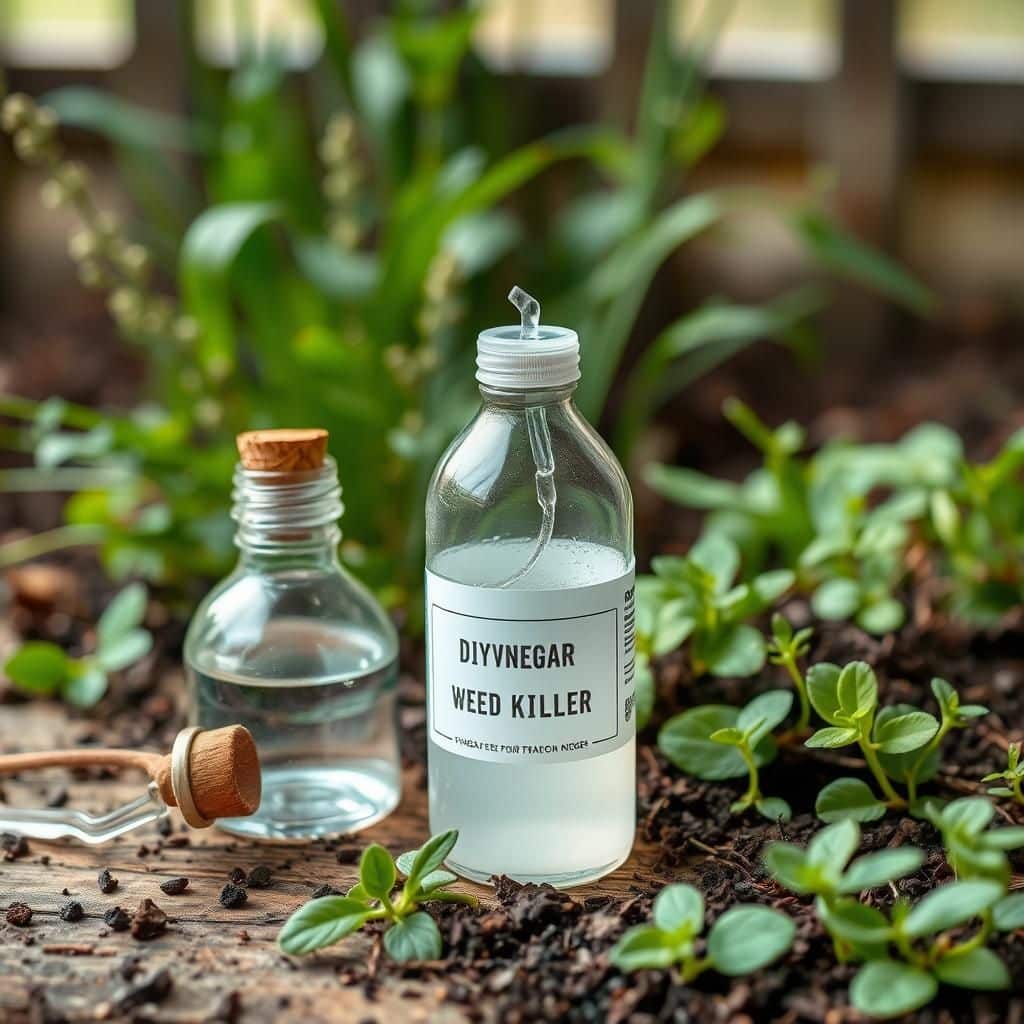DIY Weed Killer Recipe with Vinegar: Natural and Effective Solutions for Your Garden

Gardening enthusiasts often face the challenge of persistent weeds that threaten the health and beauty of their plants. While commercial herbicides can be effective, many are laden with chemicals that may be harmful to the environment and biodiversity. Fortunately, there is a natural and effective alternative: a DIY weed killer recipe using vinegar. This eco-friendly solution harnesses the power of vinegar's acetic acid to target tough weeds while being safe for your garden and the surrounding ecosystem. In this article, we'll explore the benefits of using vinegar as a weed killer and provide a simple recipe to get you started.
Effective Weed Killer Recipe with Vinegar
Creating a homemade weed killer using vinegar is an efficient and eco-friendly approach to managing unwanted plants in your garden or yard. Vinegar, particularly those with a high concentration of acetic acid, acts as a natural herbicide that can effectively kill weeds by dehydrating them. When applying this solution, it's essential to use it on a sunny day, as the heat from the sun will enhance its effectiveness by speeding up the drying process of the weed leaves. Combining vinegar with other ingredients like salt or dish soap can improve its potency, but it's crucial to be mindful that it may also affect nearby plants if it oversprays.
What Ingredients Are Needed?
The primary ingredient for making a weed killer is vinegar, preferably white vinegar or apple cider vinegar with at least 5-10% acetic acid content. Additionally, you may choose to add salt to the mixture for extra effectiveness; however, using too much salt can harm the surrounding soil. A few drops of dish soap can also be included, as it helps the solution adhere better to the leaves of the weeds, ensuring more thorough coverage. Simply combine these ingredients in a spray bottle for convenient application.
How to Apply Vinegar as a Weed Killer?
To apply the vinegar-based weed killer, fill a spray bottle with your homemade solution and spray directly onto the leaves of the weeds you want to eliminate. It is best to do this during the hottest part of the day, as this will amplify the herbicidal effect of the vinegar. Avoid spraying on windy days to reduce the risk of overspray on desirable plants. For small patches of weeds, use a targeted approach, but for larger areas, a broader application is necessary. Be careful to avoid contact with other plants, as vinegar may harm them as well.
Are There Any Risks Involved?
Using vinegar as a weed killer is generally considered safe and environmentally friendly; however, there are still some risks to keep in mind. Because vinegar is non-selective, it will kill any plant it comes into contact with, not just the weeds. Therefore, ensure that you apply it carefully, particularly in areas where you have precious flowers or crops. Additionally, if you use a high concentration of vinegar, such as horticultural vinegar with 20% acetic acid, it can potentially cause skin irritation or damage to your eyes, so wearing gloves and goggles while handling is advisable.
Tips for Enhancing Effectiveness
To boost the effectiveness of your vinegar weed killer, consider a few strategies. Add about a cup of salt to your vinegar solution to create a more potent mix; the salt dehydrates the weeds further. Furthermore, incorporating a few drops of dish soap will help the solution adhere to plant surfaces, increasing its absorption rate. You might even try warming the vinegar before application, as heat can improve its ability to penetrate the weed tissue effectively. Always test your solution on a small area to ensure it does not adversely affect neighboring plants.
Long-Term Solutions for Weed Management
While using vinegar is a quick-fix solution for killing weeds, incorporating long-term weed management strategies is crucial for maintaining a healthy garden. Regular mulching can suppress weed growth by blocking sunlight and preventing weed seeds from germinating. Furthermore, maintaining healthy soil through crop rotation and regular cultivation can lead to fewer weed problems over time. Lastly, implementing companion planting strategies or using ground cover plants can also minimize the space available for weeds to thrive, thus reducing your dependence on chemical or homemade weed killer solutions.
See also:
| Ingredient | Function |
|---|---|
| Vinegar | Acts as a natural herbicide |
| Salt | Enhances weed killing effectiveness by dehydrating |
| Dish Soap | Helps solution adhere to leaves |
What is the recipe for vinegar and dawn to kill weeds?
To create an effective weed killer using vinegar and Dawn dish soap, you can follow a simple recipe that combines these two ingredients. This mixture works well because the high acidity of vinegar helps to kill weeds, while the Dawn soap acts as a surfactant, helping the solution adhere to the leaves of the plants you want to eliminate.
Recipe for Vinegar and Dawn to Kill Weeds
1. Gather your ingredients:
- 1 gallon of white vinegar (with at least 5% acetic acid)
- 2 tablespoons of Dawn dish soap
2. Combine the ingredients:
- In a container, pour the vinegar first.
- Add the Dawn dish soap.
- Gently stir the mixture to blend without creating too many bubbles.
3. Transfer the mixture:
- Use a funnel to pour the solution into a spray bottle for easy application.
4. Application:
- Spray the mixture directly onto the weeds, ensuring to soak the leaves thoroughly. It’s best to apply on a sunny day, as the heat from the sun will enhance its effectiveness.

Understanding the Ingredients
The effectiveness of this weed killer lies in its key ingredients. Vinegar typically consists of acetic acid, which is lethal to plants at high concentrations. Meanwhile, the Dawn dish soap serves to break down the waxy coatings on leaves, ensuring the vinegar can penetrate effectively.
- Vinegar: Look for a variety with a higher acetic acid content for best results.
- Dawn dish soap: Choose original blue formula for confirmed effectiveness.
- Spray bottle: A handheld spray bottle offers precision and ease in application.
Application Tips
To achieve the best results when using this vinegar and Dawn mixture, consider the following tips for application.
- Time of Day: Apply during the hottest part of the day for maximum efficacy.
- Weather Conditions: Avoid rainy days; a sunny day enhances the drying process.
- Target Weeds: Ensure the weeds are dry before application for optimal absorption.
Safety Precautions
While this mixture is non-toxic compared to commercial herbicides, some precautions should be considered to ensure safe use around your garden and home.
- Protective Gear: Wear gloves and eyewear to avoid skin or eye irritation.
- Keep Away from Desired Plants: The solution is non-selective and will damage any plants it contacts.
- Test in Small Areas: Before full application, test in a small section to observe how plants react.
Effectiveness on Different Types of Weeds
The vinegar and Dawn solution may vary in its effectiveness based on the types of weeds you are targeting.
- Annual Weeds: These weeds typically die off quickly when sprayed with vinegar.
- Perennial Weeds: Tougher, established weeds may require multiple applications.
- Vegetable and Flower Gardens: Exercise caution; this solution will harm all plants, not just weeds.
Alternatives and Enhancements
While vinegar and Dawn makes for a simple and effective solution, there are additional ingredients or methods you could consider for enhanced results.
- Salt: Adding salt can increase the potency but may harm soil quality.
- Boiling Water: Pouring boiling water directly onto weeds is a fast and effective method.
- Essential Oils: Combining these ingredients with essential oils like clove or cinnamon oil can increase effectiveness.
Questions from Our Readers
What is a weed killer recipe with vinegar?
A weed killer recipe with vinegar typically includes vinegar, salt, and a few drops of dish soap. The acetic acid in vinegar acts as the main ingredient to kill weeds by drawing moisture out of them, while salt helps to enhance this effect. The soap aids in coating the weeds, ensuring the mixture sticks to their surfaces.
How effective is vinegar as a weed killer?
Vinegar is considered an effective natural herbicide for small or young weeds, particularly for those that are not deeply rooted. However, its efficacy decreases on mature plants with established roots. It's important to note that while vinegar can kill the top growth, it may not eliminate the root system entirely.
See also:
Is vinegar weed killer safe for pets and children?
While vinegar is generally non-toxic, it is still advisable to keep pets and children away from treated areas until the solution has dried. The strong smell of vinegar may also be unpleasant for both animals and kids. Always use caution and ensure the area is well-ventilated during application.
How should I apply the vinegar weed killer?
To apply vinegar weed killer, pour the mixture into a spray bottle and evenly coat the leaves of the weeds you want to eliminate. It's best to apply on a dry, sunny day, as this enhances the effectiveness of the vinegar. Make sure to avoid spraying desirable plants, as vinegar can harm them as well.

If you want to read more articles like DIY Weed Killer Recipe with Vinegar: Natural and Effective Solutions for Your Garden, we recommend you check out our Weeds category.
Leave a Reply

Related Articles